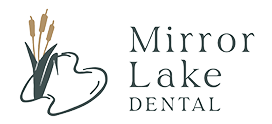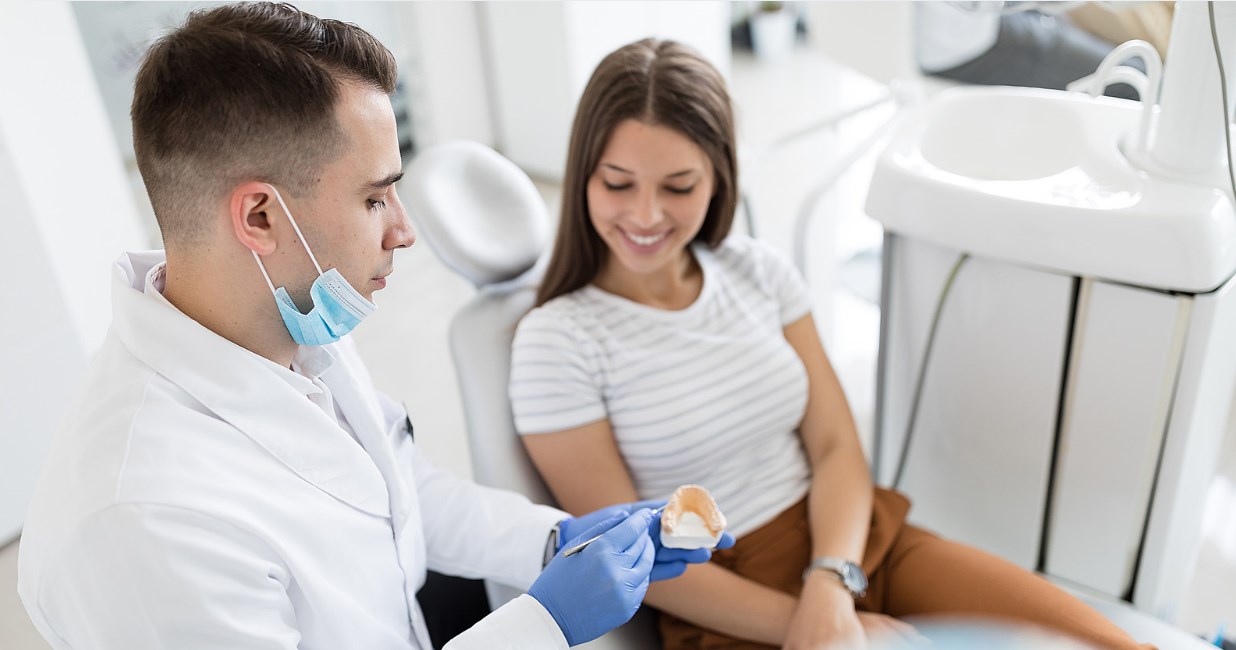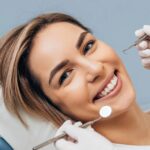A new year is a chance to turn over a new leaf—and there’s no better place to start than kicking those unhealthy dental habits that could be harming your smile. While small negative behaviours may seem harmless at first, over time, they can lead to serious oral health issues like cavities, gum disease, and even tooth loss. The good news is that replacing these unhealthy habits with positive ones can pave the way for a healthier, brighter smile. This year, make it a priority to break free from the routines that might be holding your dental health back. Below, we’ll explore five common yet unhealthy dental habits that many people struggle with and provide actionable solutions to help you overcome them as you step into a fresh start.
Unhealthy Dental Habit 1: Skipping Flossing or Flossing Inconsistently
Why It’s Harmful:
Plaque Buildup: Skipping or inconsistently flossing allows plaque and food particles to build up in the spaces between your teeth and beneath the gum line. Over time, this buildup can lead to cavities and gum disease, making your dental health deteriorate.
Bacterial Growth: Neglecting to floss creates an ideal environment for harmful bacteria to thrive in hard-to-reach areas of your mouth. These bacteria can cause inflammation, infection, and deep damage to your gum tissue if left unchecked.
Signs of Trouble: If you notice bleeding or swollen gums, persistent bad breath, or frequent cavities forming between your teeth, these are clear indicators that flossing isn’t happening as often as it should.
How to Break the Habit:
Set a Routine: Flossing can become second nature when you commit to doing it consistently. Try flossing right after brushing your teeth, at the same time each day, to establish a reliable routine that fits seamlessly into your daily habits.
Use Tools That Fit Your Lifestyle: If traditional floss feels inconvenient or difficult to use, there are plenty of alternative tools designed to make flossing easier. Floss picks, water flossers and interdental brushes are all effective options for cleaning between teeth, especially for those with braces or tight spaces.
Track Progress: To stay motivated and see how far you’ve come, consider using a habit tracker or marking off your flossing attempts on a calendar. This visual accountability can encourage long-term consistency and help you turn flossing into a permanent part of your oral care regimen.
Unhealthy Dental Habit 2: Using Teeth as Tools
Why It’s Harmful
- Cracking and Chipping: Using teeth to bite on non-food objects like bottle caps, tags, or pens can lead to fractures or chips. Teeth are designed for chewing food, not for handling hard or rigid materials that put excess pressure on them.
- Gum and Jaw Stress: Improper use of teeth can also cause gum trauma or jaw discomfort. The force applied during these actions can strain the jawline and soft tissues, leading to potential long-term damage.
Common Scenarios
It’s a habit most aren’t even aware of—opening plastic packaging, cutting thread, or breaking tape with teeth are some everyday situations where people use teeth as tools. While it might seem quick and convenient, this practice can cause unnecessary harm to your oral health.
How to Break the Habit
- Keep Real Tools Handy: Invest in and keep scissors, bottle openers, or pliers easily accessible in drawers or bags so you’ll be less tempted to rely on your teeth.
- Pause and Think: Before using your teeth, ask yourself, “Do I want to risk damaging my teeth for this task?” A quick self-check may help deter the habit.
- Educate Kids and Teens: Teach young ones the importance of using the right tools instead of their teeth. Caregivers should make sure children understand the risks of opening snack bags or bottles with their teeth and encourage better alternatives.
Unhealthy Dental Habit 3: Excessive Sugary or Acidic Snacks and Drinks
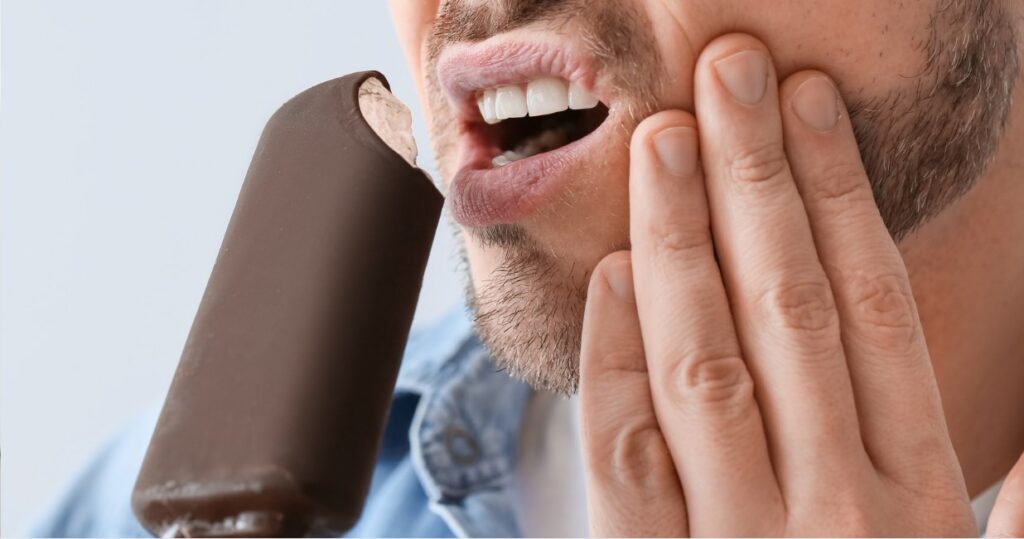
Why It’s Harmful
- Enamel Erosion and Cavities: When you consume sugary snacks or drinks, the sugar serves as food for oral bacteria. These bacteria produce acids as a byproduct, which can erode the protective enamel layer of your teeth, leading to cavities. Acidic beverages like sodas and fruit juices directly weaken your enamel, making it more susceptible to damage over time.
- Constant Exposure: Sipping sugary drinks or snacking frequently throughout the day prolongs the exposure of your teeth to harmful substances. This continuous bath of sugar and acid gives bacteria more time to produce enamel-eroding acids, significantly increasing the risk of tooth decay and erosion.
Examples of Problematic Items
Some common sugary or acidic consumables to watch out for include soda, fruit juices, sports drinks, candies, cookies, and sticky snacks like gummy candies or dried fruits. These items can adhere to teeth and prolong exposure to sugars and acids if not promptly cleaned away.
How to Break the Habit
- Plan Snack Times: Try to limit sugary or acidic treats to meal times. During meals, saliva production is naturally higher, which helps to neutralize acids and wash away food particles more effectively.
- Opt for Healthier Alternatives: Choose snacks that are tooth-friendly, such as cheese, yogurt, nuts, or crunchy vegetables like carrots and celery. These alternatives not only reduce exposure to sugar but also promote good oral health by stimulating saliva production and helping remove plaque.
- Stay Hydrated with Water: Drink water throughout the day, especially after consuming sugary or acidic foods or drinks. Water helps rinse away residual sugars and can strengthen enamel if it contains fluoride. Carry a reusable water bottle as a healthy, accessible option to maintain hydration and dental health.
Unhealthy Dental Habit 4: Aggressive Brushing or Using the Wrong Toothbrush
Why It’s Harmful
- Gum Recession and Enamel Wear: Brushing too hard or using a stiff-bristled toothbrush can damage the delicate soft tissues of your gums, causing them to recede over time. Additionally, excessive force can erode the enamel layer that protects your teeth, leaving them vulnerable to decay.
- Sensitivity and Tooth Damage: Aggressive brushing can lead to heightened tooth sensitivity by exposing the dentin beneath the enamel. It can also create micro-scratches on the enamel surface, weakening its ability to protect teeth from bacterial attacks and acid erosion.
Signs of Over-Brushing
Common indicators of over-brushing include receding gums, small notches or indentations near the gumline, and increased tooth sensitivity. If you notice any of these signs, it’s crucial to reassess your brushing habits.
How to Break the Habit
- Choose Soft Bristles: Opt for a soft-bristled toothbrush, which is effective at removing plaque while being gentle on gums and enamel. Avoid brushes labelled as medium or hard, as they can promote damage with regular use.
- Use Proper Technique: Brush with small, circular motions at a 45-degree angle to the gumline. This method is both gentle and thorough, ensuring plaque removal without causing harm. Aim to brush for at least two minutes twice a day.
- Consider an Electric Toothbrush: Many electric toothbrushes are equipped with pressure sensors that alert you if you’re brushing too hard. These tools can help you develop healthier brushing habits and reduce the risk of over-brushing.
By adopting gentler techniques and using the right tools, you can effectively clean your teeth while preserving your enamel and gum health.
Unhealthy Dental Habit 5: Skipping Regular Dental Checkups and Cleanings
Why It’s Harmful
- Missed Early Warnings: Regular dental checkups are essential for detecting small issues like cavities or gingivitis before they escalate into severe complications. Without routine exams, these problems can progress unchecked, leading to complex and painful conditions that are harder and more expensive to treat.
- Tartar Accumulation: Even with diligent brushing and flossing, it’s impossible to remove all hardened plaque (tartar) that forms on teeth over time. Professional cleanings are the only way to eliminate these stubborn deposits, preventing gum inflammation and decay.
- Consequences of Avoidance: Avoiding dental visits doesn’t just put your oral health at risk—it can result in toothaches, gum disease, infections, and eventually costly procedures like root canals or implants.
How to Break the Habit
- Plan Ahead: Commit to scheduling your dental appointments early in the year or immediately after each visit. This ensures a regular cadence and helps you stay accountable.
- Leverage Technology: Use the reminder features on your smartphone or download dental care apps to set notifications for upcoming checkups. Staying organized can make all the difference in maintaining consistency.
- Overcoming Anxiety: If dental visits make you anxious, discuss your concerns with your dentist. They can suggest options such as sedation dentistry or techniques to help you stay calm. Bringing a trusted friend or family member along for support can also make the experience more manageable.
By prioritizing regular dental checkups and cleanings, you protect your oral health, catch potential issues early, and avoid unnecessary complications in the future.
Unhealthy Dental Habit 6: Ignoring Oral Pain or Discomfort
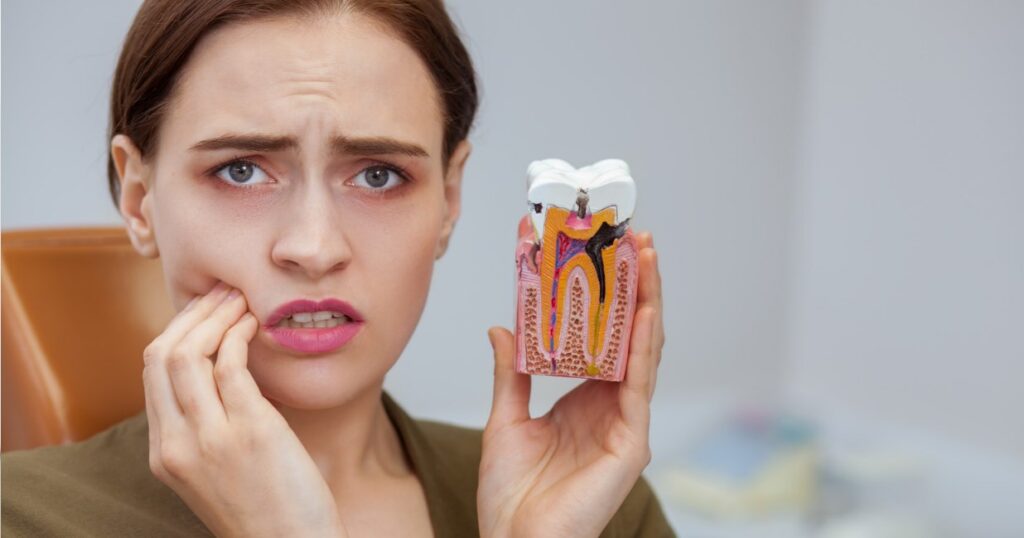
Why It’s Harmful:
Ignoring oral pain or discomfort may seem like a minor issue, but it can have significant consequences for your overall dental health.
- Early Detection Missed:
Minor aches or sensitivity often indicate the start of issues such as cavities, infections, or gum disease. Catching these problems early can prevent them from escalating into more severe conditions.
- Worsening Conditions:
Left untreated, issues such as decay, pulp inflammation, or gum disease can lead to complications like painful abscesses, tooth loss, or even systemic health concerns if an infection spreads.
Signs of Trouble:
Be vigilant about recognizing potential red flags that may signal an underlying dental issue. Common warning signs include:
- Tooth sensitivity when biting down or consuming hot or cold foods or drinks.
- Persistent dull aches, sharp pains, or sudden discomfort.
- Gums that appear red, swollen, or feel tender to the touch.
How to Break the Habit:
- Seek Prompt Care: At the first sign of oral discomfort, schedule an appointment with your dentist. Early intervention can be the difference between a simple restorative procedure and more complex, invasive treatments.
- Track and Note Symptoms: Keep a log of your oral symptoms, including the duration, triggers, and intensity of the pain or sensitivity. Sharing these details with your dentist can lead to a faster and more accurate diagnosis.
- Use OTC Pain Relief Wisely: While over-the-counter pain relievers can help manage symptoms for a short time, it’s crucial to remember they only mask the problem. A professional exam is necessary to determine the root cause and provide appropriate treatment.
By addressing oral pain or discomfort promptly, you can prevent minor issues from turning into major problems and maintain a healthier, pain-free smile.
Conclusion
Breaking free from unhealthy dental habits is an important step toward a healthier smile. To recap, avoid skipping flossing, as it helps reach areas between teeth that brushing misses. Refrain from using your teeth as tools to open packages or bottles, as this can cause damage. Minimize frequent sugary or acidic snacking, which increases the risk of cavities and enamel erosion. Practice gentle brushing to protect your gums and enamel from unnecessary wear. Finally, don’t skip regular dental checkups—these visits are key to addressing potential issues before they become serious.
Adopting better habits takes time, but small, consistent daily actions can lead to significant improvements in your oral health. Start by making one positive change today and build from there for a brighter, healthier future.
Take the first step toward better oral health today by scheduling a dental checkup or consulting with the experts at Mirror Lake Dental. Our dedicated team is here to help you achieve a brighter and healthier smile. Visit our Contact Form to book your appointment. Your smile deserves the best care—don’t wait to prioritize your oral health!
